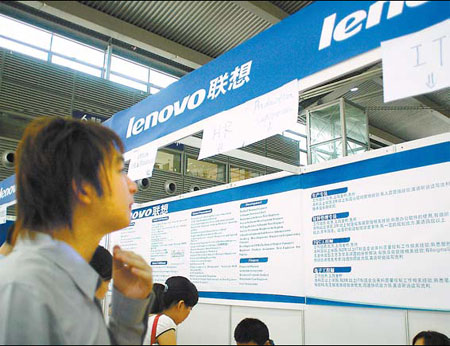
|
BIZCHINA> Biz Life
 |
|
Related
State-owned groups top students' wish list
By Liu Jie (China Daily)
Updated: 2008-06-27 09:46 Domestic companies, especially State-owned enterprises (SOEs), are among the most popular choices in employment for university students in China, but new graduates' salary expectations are falling, the latest survey conducted by job-hunting firm ChinaHR.com reported.
 The annual survey called, Best Employers for Chinese University Students, which has been running since 2002, assessed companies' compensation, corporate brand, corporate culture and employee development. This year's survey, which was conducted between November 2007 and April 2008, looked at 182,000 graduates, undergraduates, PhD and college students from 676 universities and colleges nationwide. According to the report, 56 percent or 28 of the top 50 employers were Chinese enterprises, marking the first year when domestic groups beat their foreign counterparts in the survey. Four of the top five groups were domestic flagship firms, and included China Mobile Communications Corp, Huawei Technology Co Ltd, Lenovo Group Co Ltd and Haier Co Ltd. In past years, local groups have not fared so well in the top 50. In 2004 just 17 domestic firms were in the top flight. In 2005 the survey reported 19 while 2006 and 2007 saw the number of local groups rise to 24 and 25 respectively.
"The results demonstrate that local firms have improved effectively during recent years in terms of employment systems, working environments, compensation packages, as well as internal promotion. And they are competing with their foreign counterparts in the human resources (HR) market," said Zhang Tingwen, senior researcher with ChinaHR.com. A group of State-owned behemoths, including China Grid Group Corp and China Construction Bank, debuted in the top 50 elite. Nearly one fourth of those surveyed said SOEs were their first choice when seeking employment. "With the deepening of SOE restructuring and reform, SOEs' comprehensive competitiveness, especially in terms of salary and self-development opportunities, has been enhanced greatly," explained Zhang Jianguo, president of ChinaHR.com. However, insiders claimed that, amid intensified competition in the employment market, job seekers, including university students, attached great importance on job stability, which is one of SOEs' strengths. Compensation packages in SOEs are also lucrative as are welfare, stock dividends and pension. According to Liu Lingxin, senior manager at China Mobile's HR department, the company is competitive in the HR market for its comprehensive package system, which not only guarantees effective training and fair promotion within the company but also ensures competitive salaries. "Our system aims to provide fair self-development opportunities and decent lives for our employees," he noted. The HR senior manager also said that overall training in technical skills, psychology, social communication and corporate culture were issues highlighted in China's No 1 wireless communications operating company. This proved to be important factors for graduates with little social and career experience. Salary expectation The 2008 Best Employers for Chinese University Students reported that students' salary expectations were continuing to decline, due to the intensified HR market, competition and practical and reasonable self-evaluation. The survey showed that 77.6 percent of those surveyed expected the monthly salary after graduation to be between 1,000 to 4,000 yuan. In 2007 74.5 percent of those surveyed expected a graduation salary to fall in this bracket. Only 2.1 percent of those questioned said they expected a monthly salary of over 8,000 yuan. This percentage has been consistently falling over the years. In 2005, 10.4 percent expected to be paid over 8,000, 5.1 percent in 2006 and 3.3 percent in 2007 respectively. "Students become rational, who have realized that, due to lack of experiences and general employment condition, they should never think themselves above their business and must start their career on the ground," said Zhang Jianguo. With the increase in popularity of higher education in China, the number of graduates is continuing to rise. There is an estimated 5.59 million students this year in China, compared to 3.38 million in 2005, 4.13 million in 2006 and 4.91 million last year. A group of domestic and foreign enterprises have set up collaborations with universities in research and development and talent training. They also carry out campus recruitment activities to attract qualified graduates. "There is still gap between enterprises' requirements and the skills and demands of students," said senior researcher Zhang. He cited transnational hi-tech enterprises IBM and Microsoft as an example. They need engineering and technological talents with not only professional skills but also language ability, communication skills and sound psychological conditions, facilitating their global operation and team-work. However, graduates with such comprehensive quality are rare. On the other hand, students hope to have a chance to get real knowledge of companies and their business to see whether they are really suitable for their future jobs. Internships in large corporations are usually a chance for rough look-around, which cannot meet their demands. "Matching the two sides, of course, needs efforts of both enterprises and students. In addition, HR professionals and consultants can do contributions on providing guidance for both and promoting bilateral communications," he added. (For more biz stories, please visit Industries)
|